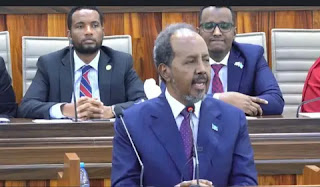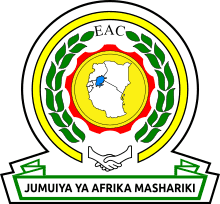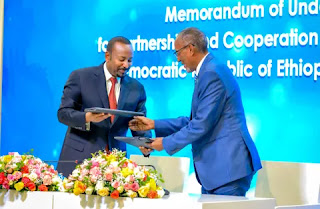Why it is Important to Lift Arm Embargo in Somalia
History of Arms
Embargo imposed on Somalia Government
Arms
embargo is a prohibition that applies to the trade or activities related to
military items and is usually imposed by the United Nations. Somalia has a
history of conflict and instability, and there have been efforts to control the
flow of arms into the country. The United Nations Security Council has
authorized regional organizations, such as the African Union, to assist the
Somali government in establishing security and implementing arms embargoes on
specific entities or regions within Somalia, such as Al-Shabaab. The arms
embargo was first introduced on Somalia in 1992 with the aim of reducing the
supply of weapons to warring clan-based groups that had ousted President
Mohamed Siad Barre, leading to a civil war in the country. Nonetheless, the
ineffective and corrupt federal government in Mogadishu has been actively
supporting the removal of the embargo, stating its inability to acquire weapons
for countering the threat posed by al-Shabaab.
In
June 2001 Security Council Resolution 1356 allowed for exemptions to the
embargo for supplies of non-lethal military equipment for use in humanitarian
operations. In July 2002 Security Council Resolution 1425 clarified the scope
of the arms embargo, making clear that it prohibited the financing of arms
acquisitions as well as the direct or indirect sale or supply of technical
advice or military training. In December 2006 Security Council Resolution 1725
partially lifted the UN arms embargo on Somalia. The resolution authorized the
Intergovernmental Authority for Development (IGAD) and African Union member
States to deploy a regional intervention force to protect Somalia's
Transitional Federal Government (TFG) and to arm and train the TFG security
forces. The resolution maintains the existing embargo but states that its
provisions do not apply to transfers of military equipment, technical training
and assistance intended for the regional intervention force.
In
February 2007 Security Council Resolution 1744 limited the embargo to non-state
actors. It allowed the supply of weapons and military equipment intended solely
for the purpose of helping develop Somali security sector institutions if the
sanctions committee on Somalia had been notified in advance and on a
case-by-case basis and if the SC had not made a negative decision within five
working days after the notification. In November 2008 Security Council
Resolution 1844 amended the arms embargo to target entities that have violated
the arms embargo or obstructed the delivery of humanitarian assistance to or in
Somalia. In March 2013 Security Council Resolution 2093 amended the
restrictions and procedures related to arms supplies to the Somalian Government
while maintaining the embargo on arms supplies to non-state actors in the
country. The embargo continues to be extended
annually since and is currently in force until 17 November 2023.
Reasons why Arms Embargo should be lifted in
Somalia
In
order to enforce the arms embargo on Somalia, the Security Council authorized
the interception of illegal weapon imports, charcoal exports, and components
used for improvised explosive devices through maritime means. Additionally,
they extended the mandate of the Panel of Experts on Somalia. With the arms
embargo in place, all countries were required to take necessary actions to
prevent the delivery of weapons and military equipment to Somalia. This
included prohibiting the financing of weapon acquisitions and deliveries, as
well as the provision of technical advice, financial support, and other forms
of assistance or training related to military activities, unless it was
intended for Somalia's security and police institutions at the national and
local level, which were exempt from these restrictions.
The
arms embargo excludes the restriction on supplying weapons, military equipment,
offering technical guidance, financial aid, and other support, including
training, specifically aimed at enhancing Somalia's security and police
organizations to ensure the safety and protection of its citizens. Arms embargo
have various negative effects in Somalia including reduction in capacity of
government to ensure its national security, disrupt the balance of power and
straining strain diplomatic relations. It is therefore important for UN to
consider lifting arms embargo. Given that Somalia is moving towards stability,
lifting arm embargo would have a ripple effect on faster achievement of
stability and economic stability. Here are some of the reasons why arm embargo should be lifted in
Somalia:
1.
Enhanced Security by
Building Military Force to Fight Terrorism:
Lifting
the embargo would allow the Somali government to enhance its security forces'
capabilities in combating terrorism and insurgent groups such as Al-Shabaab. A
more robust military capacity can contribute to stabilizing the country,
maintaining law and order, and protecting the population from violent extremist
threats. Lifting an arms embargo would allow Somalia enhance its security
forces by providing them with advanced weaponry, equipment, and training can improve
their capabilities to combat internal security threats, such as insurgencies or
terrorist organizations. Well-equipped security forces can effectively respond
to security challenges, potentially leading to increased stability.
In
addition, lifting arms embargo improves access to arms and military equipment
can empower security forces to conduct more effective counterterrorism
operations. This includes capabilities like surveillance systems,
intelligence-gathering tools, communication equipment, and advanced weaponry.
Enhanced resources can aid in disrupting terrorist networks, apprehending
individuals involved in terrorist activities, and preventing potential attacks.
Advanced military equipment often comes with the latest technological
innovations, such as advanced sensors, targeting systems, communication
systems, and stealth technology. Lifting an arm embargo would enable Somalia
military force to gain access to these advanced technologies, which can improve
the effectiveness and efficiency of its military force.
2. Promoting
State Sovereignty
Imposing
an arms embargo on a country can be seen as a form of external interference or
control over its internal affairs. Given that Somalia is a sovereign state,
continuing to impose arms embargo undermines Somalia's sovereignty and ability
to defend itself. Lifting the embargo would enable the Somali government to
exercise its rights and responsibilities as a recognized sovereign state by
acquiring necessary defensive capabilities.
By lifting the embargo, a state can assert its independence and autonomy
in making decisions related to its defense and security. This action sends a
message that the country is capable of determining its own defense needs and is
not dependent on others for its protection.
3. Enhancing
Peacekeeping and Peacebuilding
The
Somali government, along with the African Transition Mission in Somalia (ATMIS), has been engaged in
efforts to restore peace and stability to the country. Therefore, lifting the
embargo would help strengthen Somalia police force capacity to fulfil its
mission and provide a more secure environment for reconstruction and
development initiatives.
4. Enhancing
Regional Balance
Arms
embargo on Somalia creates an imbalance in the region, as neighboring countries
are not subject to similar restrictions. Lifting the embargo claim that it
would level the playing field and prevent Somalia from being at a disadvantage
in terms of defense capabilities. The lifting of an arm embargo can serve as a
confidence-building measure between Somalia and neighbouring countries with
strained relations. By allowing the exchange of military equipment, it can
signal a willingness to engage in dialogue, build trust, and reduce tensions.
This can contribute to a more stable regional environment and decrease the
likelihood of armed conflicts or escalations.
5. Reinforcing
the Security Agencies after Departure of ATMIS
There is a plan for withdraw
African Transition Mission in Somalia (ATMIS)
by 2024. However, as it a swift pullout of African Union troops in Somalia
could lead to a swift collapse of the Somali government, similar to what
happened in Afghanistan when U.S. troops left in August 2021. The decision to
delay the drawdown of the African Transition Mission in Somalia (ATMIS) may
indicate gaps in rebuilding the country’s security forces meant to take over
once the continental arrangement fully exits. Therefore, lifting arm embargo
would allow the government of Somalia to build capacity of its security
agencies to be in a position to bridge the security gaps left when ATMIS
departs.
Criticism of an Article
Opposing Lifting of Arm Embargo in Somalia
An
article by HIRAAL Institute title “LOCKED AND LOADED: THE DANGERS OF
PREMATURELY LIFTING THE SOMALI ARMS EMBARGO” claims that lifting arm
embargo would destabilize Somalia.
However, the article fails to give an alternative for promoting national
security when ATMS departs in 2024. Governed and controlled lifting arm embargo
in Somalia remains the only viable solution for Somalia to attain its
stability. Though the article claims that lifting arm embargo would enhance clan-based
power struggles, it fails to highlight the connection. On contrary lifting arm
embargo would not support clans since it will be done in a framework that
ensures arms are accessible to government security agencies only. While it
raises certain concerns, it fails to present a balanced view and overlooks
critical factors that warrant a re-evaluation of the embargo. The article is
criticised for the following:
1.
Failure to acknowledge Somalia's
progress: The article neglects to acknowledge the considerable
progress Somalia has made in recent years. It fails to recognize the efforts
made by the Somali government, regional partners, and international stakeholders
to stabilize the country, combat terrorism, and build institutions. Ignoring
these advancements leads to an incomplete and skewed perspective.
2.
Ignoring the needs of the Somali
government: The article overlooks the legitimate security
concerns of the Somali government. Somalia faces significant security
challenges, including terrorist organizations such as Al-Shabaab. Lifting the
arms embargo could potentially help the Somali government in its efforts to
counter these threats and safeguard its citizens.
3.
False Allegations of Open Arm Market:
The article claims that there is an open arm market in Somalia for arms where
citizens might easily purchase arms. However, the article fails to provide any
evidence of the existence of an open market in Somalia. The fact is, there is
no open arm market in Somalia.
4.
False Allegations that Government have
no Ports Control: The article claims that the government
does not have full control over all of its ports of entry and this is why arm
embargo should not be lifted. However, the article does not provide evidence to
back these claims. The fact is, the government of Somalia have control over the
ports and all entry of points under its jurisdiction.
5.
Absence of contextual analysis:
The article lacks a contextual analysis of the Somali conflict and fails to
consider the dynamics on the ground. Somalia is a complex nation with multiple
stakeholders, regional interests, and power struggles. A nuanced understanding
of these factors is necessary to assess the impact of the arms embargo
accurately.
6.
Failure to Propose Alternatives:
The article does not propose viable alternatives to the current arms embargo.
Instead of advocating for maintaining the status quo, it should explore other
measures that can address Somalia's security concerns without compromising
regional stability. For example, the article could have discussed the
possibility of implementing stricter arms control mechanisms or creating
regional partnerships to mitigate potential risks associated with lifting the
embargo.
7.
Disregarding International Engagement:
The article disregards the importance of international engagement and support
in post-conflict situations. Lifting the arms embargo does not automatically
imply uncontrolled arms flow into Somalia. Responsible lifting would involve
carefully crafted agreements, rigorous monitoring mechanisms, and support for
capacity-building programs to ensure that weapons are used solely for
legitimate defense purposes. By engaging with Somalia and providing necessary
assistance, the international community can help guide the country toward
stability and prevent illicit arms proliferation.
Conclusion
By
Abdullahi Mohodin Hassan
( Abdullahi Yabarow)
LLM
Siigaale1@




Comments
Post a Comment